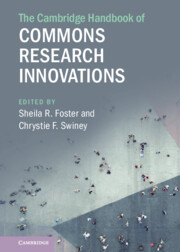Book contents
- The Cambridge Handbook of Commons Research Innovations
- The Cambridge Handbook of Commons Research Innovations
- Copyright page
- Contents
- Figures
- Tables
- Contributors
- Introduction
- Part I Revisiting the Origins and Evolution of Commons Thought
- Part II Averting New Tragedies
- Part III New Forms of Contested Commons
- Part IV Urban Landscape and Infrastructure as a Commons
- Part V Reassessing Old and New Institutions for Collective Action
- 13 Business Improvement Districts and the Urban Commons
- 14 To Have and To Hold? Community Land Trust as Commons
- 15 Ostromian Logic Applied to Civil Society Organizations and the Rules That Shape Them
- 16 A Conceptual Model of Polycentric Resource Governance in the 2030 District Energy Program
- Part VI Managing and Restoring the Commons
- Part VII Law, Legal Theory, and the Commons
- Part VIII Technology, the Internet, and the Future of Commons Governance
- Index
14 - To Have and To Hold? Community Land Trust as Commons
from Part V - Reassessing Old and New Institutions for Collective Action
Published online by Cambridge University Press: 29 October 2021
- The Cambridge Handbook of Commons Research Innovations
- The Cambridge Handbook of Commons Research Innovations
- Copyright page
- Contents
- Figures
- Tables
- Contributors
- Introduction
- Part I Revisiting the Origins and Evolution of Commons Thought
- Part II Averting New Tragedies
- Part III New Forms of Contested Commons
- Part IV Urban Landscape and Infrastructure as a Commons
- Part V Reassessing Old and New Institutions for Collective Action
- 13 Business Improvement Districts and the Urban Commons
- 14 To Have and To Hold? Community Land Trust as Commons
- 15 Ostromian Logic Applied to Civil Society Organizations and the Rules That Shape Them
- 16 A Conceptual Model of Polycentric Resource Governance in the 2030 District Energy Program
- Part VI Managing and Restoring the Commons
- Part VII Law, Legal Theory, and the Commons
- Part VIII Technology, the Internet, and the Future of Commons Governance
- Index
Summary
Is a community land trust (CLT) a commons, metaphorically or in actuality?The CLT-Commons inquiry is indicated by the ubiquity of CLTs in fair development movements: reclaiming commons for the commoners in contexts of vacant disinvested housing held away from people needing it for housing by its private and State ‘stewards.’ Community Land Trusts (CLTs) are part of nearly every progressive response to today’s affordable housing crisis because they decommodify housing, taking it out of the speculative market, and securing land for permanently affordable housing.Although the CLT offers an intermediate form of land ownership and control between speculative market and the State, its distinct tenure and shared equity legal structure is not sufficient, alone, to merit a commons analysis. CLTs increasingly are promoted in housing policy circles as an economically efficient form of affordable housing. This suppresses the central features of classic-form CLT rooted in collective governance of the land by the economically marginalized and working-class people residing on the CLT land, in conjunction with non-resident CLT members, neighbors and supportive stakeholders who also participate in the governance of the CLT land to assure its transgenerational and multi-stakeholder purposes.
Keywords
- Type
- Chapter
- Information
- The Cambridge Handbook of Commons Research Innovations , pp. 164 - 175Publisher: Cambridge University PressPrint publication year: 2021



